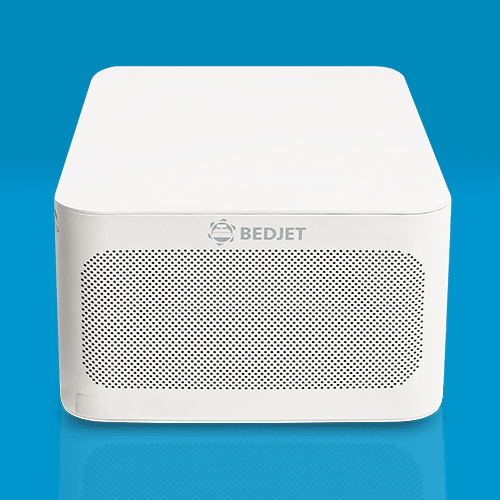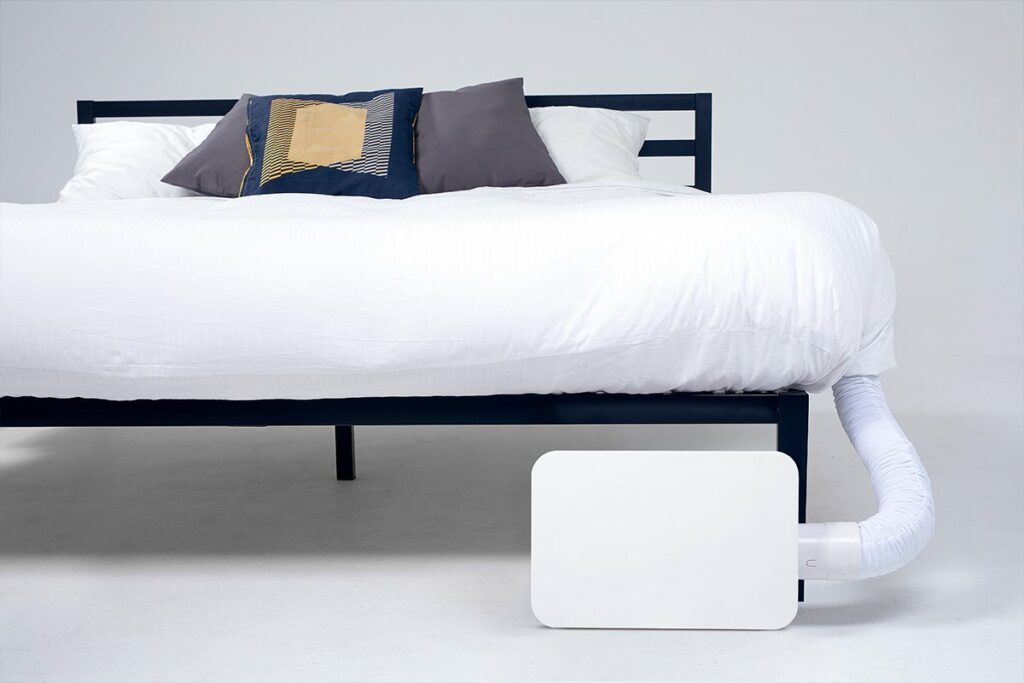
Tired of tossing and turning all night? Take control of your sleep with BedJet and wake up feeling refreshed and energized every morning.
| Tips | Description |
|---|---|
| Use blackout curtains | Use curtains to block out light |
| Use eye mask | Use an eye mask to block out light |
| Use earplugs | Use earplugs to block out noise |
| Use white noise machine | Use a white noise machine to drown out noise |
| Keep the room temperature cool | Keep the room temperature between 60 and 67 degrees Fahrenheit |
| Use a comfortable mattress and pillows | Use comfortable and supportive mattress and pillows |
| Keep your bedroom dark, quiet, and cool | Keep your bedroom's environment dark, quiet, and cool |
Avoid Stimulants and Depressants
Stimulants and depressants can both affect our ability to fall and stay asleep. Caffeine, for example, is a stimulant that can interfere with the production of melatonin and keep us awake. Alcohol, on the other hand, is a depressant that can make us feel drowsy at first but can disrupt sleep later in the night.
A. The Effects of Caffeine and Alcohol on Sleep
Caffeine is a stimulant that can stay in our system for several hours, making it difficult to fall asleep and stay asleep. Alcohol, on the other hand, can make us feel sleepy at first but can disrupt our sleep later in the night, leading to more fragmented sleep and less restful sleep overall.
B. Tips for Reducing Stimulant and Depressant Intake
To improve your sleep quality, try the following:
| Tips | Description |
|---|---|
| Avoid consuming caffeine in the afternoon and evening | Avoid caffeine intake in the afternoon and evening |
| Limit alcohol intake | Limit alcohol intake and avoid drinking within a few hours of bedtime |
| Avoid smoking or using nicotine products | Avoid smoking or using nicotine products, which are also stimulants |
Essential Tips for Improving Your Sleep Quality
- Consistent sleep schedule, optimal sleep environment, avoiding stimulants and depressants, exercising regularly, managing stress, evaluating medications, paying attention to diet, investing in a comfortable mattress and pillow, considering natural remedies, and seeking professional help when needed are important considerations for better sleep.
- These ten considerations can help improve sleep quality and overall health and well-being. If experiencing chronic sleep problems, seek help from a healthcare professional for personalized advice and treatment.
Exercise Regularly
Regular exercise has many health benefits, including improving sleep quality. Exercise can help reduce stress and anxiety, promote relaxation, and regulate our circadian rhythms.
A. The Benefits of Exercise on Sleep Quality
Exercise has been shown to improve sleep quality in several ways. It can reduce the time it takes to fall asleep, increase the amount of time spent in deep sleep, and reduce the number of times we wake up during the night.
B. Best Times to Exercise for Optimal Sleep
To get the most benefit from exercise, try to exercise at least three hours before bedtime. This will give your body enough time to cool down and relax before you try to sleep. If you can, try to exercise in the morning or early afternoon, as this can help regulate your circadian rhythms and make it easier to fall asleep and wake up at the same time each day.
Manage Stress
Stress and anxiety can have a significant impact on our ability to fall and stay asleep. When we're stressed, our bodies produce more cortisol, a hormone that can interfere with the production of melatonin and disrupt our sleep.
A. The Relationship Between Stress and Sleep
Stress and sleep are closely linked. When we're stressed, it can be difficult to fall asleep or stay asleep, which can lead to more stress and anxiety. This can create a vicious cycle that can be challenging to break.
B. Tips for Managing Stress and Promoting Relaxation
To manage stress and promote relaxation, try the following:
| Tips | Description |
|---|---|
| Practice relaxation techniques | Practice relaxation techniques like deep breathing, meditation, or yoga |
| Create a relaxing bedtime routine | Create a relaxing bedtime routine to help you wind down before bed |
| Avoid stimulating activities before bed | Avoid stimulating activities like working or using electronic devices for at least an hour before bed |
| Write down your worries | Write down your worries or concerns in a journal to help clear your mind before bed |
Evaluate Your Medications
Certain medications can affect our sleep quality. If you're having trouble sleeping, it's essential to talk to your healthcare provider about any medications you're taking.
A. Medications That May Affect Sleep Quality
Some medications that can affect sleep quality include:
- Antidepressants
- Beta-blockers
- Corticosteroids
- Stimulants like ADHD medications
B. Tips for Talking to Your Healthcare Provider About Medication and Sleep
If you're concerned that your medications may be affecting your sleep, talk to your healthcare provider. They may be able to adjust your medication or recommend other treatments to help improve your sleep quality.
Pay Attention to Your Diet
What we eat can have a significant impact on our sleep quality. Eating a well-balanced diet that includes plenty of fruits, vegetables, lean protein, and whole grains can help improve sleep quality.
A. The Impact of Diet on Sleep Quality
Certain foods and drinks can affect our sleep quality. For example, foods that are high in sugar or fat can cause a spike in blood sugar, which can disrupt sleep. Eating heavy meals before bedtime can also make it difficult to fall asleep and stay asleep.
B. Tips for Eating a Well-Balanced Diet and Avoiding Heavy Meals Before Bedtime
To improve your sleep quality, try the following:
| Tips | Description |
|---|---|
| Eat a well-balanced diet | Eat a well-balanced diet that includes plenty of fruits, vegetables, lean protein, and whole grains |
| Avoid eating heavy meals before bedtime | Avoid eating heavy meals before bedtime |
| Limit your intake of sugary or fatty foods and drinks | Limit your intake of sugary or fatty foods and drinks |
Invest in a Comfortable Mattress and Pillow
The surface on which you sleep can have a significant impact on your sleep quality. Investing in a comfortable mattress and pillow can help improve your sleep quality and reduce the risk of back pain or other discomfort.
A. The Importance of a Comfortable Sleep Surface
A comfortable sleep surface can help reduce pressure points and support your body's natural curves. This can help reduce the risk of back pain, which can interfere with sleep.
B. Tips for Choosing the Right Mattress and Pillow
When choosing a mattress and pillow, consider the following:
| Tips | Description |
|---|---|
| Your sleeping position | Choose a mattress and pillow based on your sleeping position |
| Your weight and body type | Choose a mattress and pillow based on your weight and body type |
| Your personal preferences for firmness and support | Choose a mattress and pillow based on your personal preferences for firmness and support |
Are you having trouble sleeping at night? Do you wake up feeling groggy and tired? If so, you're not alone. Many people struggle with insomnia or other sleep disorders that prevent them from getting the restful sleep they need. The good news is that there are many things you can do to improve your sleep quality. In this article, we'll explore ten important considerations for better sleep.
Establish a Consistent Sleep Schedule
One of the most important things you can do to improve your sleep quality is to establish a consistent sleep schedule. This means going to bed and waking up at the same time every day, even on weekends.
A. The Importance of Consistent Sleep and Wake Times
Consistency is key when it comes to sleep. Our bodies thrive on routine, and having a consistent sleep schedule can help regulate our circadian rhythms. This, in turn, can improve the quality of our sleep and make it easier to fall asleep and wake up feeling rested.
B. Tips for Creating a Sleep Schedule
To establish a consistent sleep schedule, start by setting a bedtime and wake-up time that works for you. Stick to these times as closely as possible, even on weekends. It may take a few weeks to adjust to the new schedule, but over time, your body will get used to it. Be patient and consistent, and you'll soon start to notice improvements in your sleep quality.
Optimize Your Sleep Environment
The environment in which you sleep can have a significant impact on the quality of your sleep. There are several factors to consider when optimizing your sleep environment, including light, noise, and temperature.
A. The Impact of Light, Noise, and Temperature on Sleep Quality
Light, noise, and temperature can all affect our ability to fall and stay asleep. Bright light can interfere with the production of melatonin, a hormone that regulates sleep. Noise can be distracting and make it difficult to fall asleep or stay asleep. And if the temperature is too hot or too cold, it can be challenging to get comfortable and drift off.
B. Tips for Creating a Sleep-Friendly Environment
To optimize your sleep environment, try the following:
- Use blackout curtains or an eye mask to block out light.
- Use earplugs or a white noise machine to drown out noise.
- Keep the room temperature cool and comfortable, between 60 and 67 degrees Fahrenheit.
- Make sure your mattress and pillows are comfortable and supportive.
- Keep your bedroom dark, quiet, and cool.
Avoid Stimulants and Depressants
Stimulants and depressants can both affect our ability to fall and stay asleep. Caffeine, for example, is a stimulant that can interfere with the production of melatonin and keep us awake. Alcohol, on the other hand, is a depressant that can make us feel drowsy at first but can disrupt sleep later in the night.
A. The Effects of Caffeine and Alcohol on Sleep
Caffeine is a stimulant that can stay in our system for several hours, making it difficult to fall asleep and stay asleep. Alcohol, on the other hand, can make us feel sleepy at first but can disrupt our sleep later in the night, leading to more fragmented sleep and less restful sleep overall.
B. Tips for Reducing Stimulant and Depressant Intake
To improve your sleep quality, try the following:
- Avoid consuming caffeine in the afternoon and evening.
- Limit alcohol intake and avoid drinking within a few hours of bedtime.
- Avoid smoking or using nicotine products, which are also stimulants.
Exercise Regularly
Regular exercise has many health benefits, including improving sleep quality. Exercise can help reduce stress and anxiety, promote relaxation, and regulate our circadian rhythms.
A. The Benefits of Exercise on Sleep Quality
Exercise has been shown to improve sleep quality in several ways. It can reduce the time it takes to fall asleep, increase the amount of time spent in deep sleep, and reduce the number of times we wake up during the night.
B. Best Times to Exercise for Optimal Sleep
To get the most benefit from exercise, try to exercise at least three hours before bedtime. This will give your body enough time to cool down and relax before you try to sleep. If you can, try to exercise in the morning or early afternoon, as this can help regulate your circadian rhythms and make it easier to fall asleep and wake up at the same time each day.
Manage Stress
Stress and anxiety can have a significant impact on our ability to fall and stay asleep. When we're stressed, our bodies produce more cortisol, a hormone that can interfere with the production of melatonin and disrupt our sleep.
A. The Relationship Between Stress and Sleep
Stress and sleep are closely linked. When we're stressed, it can be difficult to fall asleep or stay asleep, which can lead to more stress and anxiety. This can create a vicious cycle that can be challenging to break.
B. Tips for Managing Stress and Promoting Relaxation
To manage stress and promote relaxation, try the following:
- Practice relaxation techniques like deep breathing, meditation, or yoga.
- Create a relaxing bedtime routine to help you wind down before bed.
- Avoid stimulating activities like working or using electronic devices for at least an hour before bed.
- Write down your worries or concerns in a journal to help clear your mind before bed.
Evaluate Your Medications
Certain medications can affect our sleep quality. If you're having trouble sleeping, it's essential to talk to your healthcare provider about any medications you're taking.
A. Medications That May Affect Sleep Quality
Some medications that can affect sleep quality include:
- Antidepressants
- Beta-blockers
- Corticosteroids
- Stimulants like ADHD medications
B. Tips for Talking to Your Healthcare Provider About Medication and Sleep
If you're concerned that your medications may be affecting your sleep, talk to your healthcare provider. They may be able to adjust your medication or recommend other treatments to help improve your sleep quality.
Pay Attention to Your Diet
What we eat can have a significant impact on our sleep quality. Eating a well-balanced diet that includes plenty of fruits, vegetables, lean protein, and whole grains can help improve sleep quality.
A. The Impact of Diet on Sleep Quality
Certain foods and drinks can affect our sleep quality. For example, foods that are high in sugar or fat can cause a spike in blood sugar, which can disrupt sleep. Eating heavy meals before bedtime can also make it difficult to fall asleep and stay asleep.
B. Tips for Eating a Well-Balanced Diet and Avoiding Heavy Meals Before Bedtime
To improve your sleep quality, try the following:
- Eat a well-balanced diet that includes plenty of fruits, vegetables, lean protein, and whole grains.
- Avoid eating heavy meals before bedtime.
- Limit your intake of sugary or fatty foods and drinks.
Invest in a Comfortable Mattress and Pillow
The surface on which you sleep can have a significant impact on your sleep quality. Investing in a comfortable mattress and pillow can help improve your sleep quality and reduce the risk of back pain or other discomfort.
A. The Importance of a Comfortable Sleep Surface
A comfortable sleep surface can help reduce pressure points and support your body's natural curves. This can help reduce the risk of back pain, which can interfere with sleep.
B. Tips for Choosing the Right Mattress and Pillow
When choosing a mattress and pillow, consider the following:
- Your sleeping position
- Your weight and body type
- Your personal preferences for firmness and support
Case Study: How Consistent Sleep Schedule Improved My Life
For years, I struggled with getting enough sleep. I would stay up late most nights and sleep in on the weekends, leading to a constant feeling of exhaustion and grogginess. I knew I needed to make a change, but I didn't know where to start.
After doing some research, I decided to focus on establishing a consistent sleep schedule. I set a bedtime and wake-up time for every day of the week, even on the weekends. At first, it was difficult to stick to this schedule, especially on nights when I had plans with friends or a deadline for work. But I persevered, and eventually, it became a habit.
The results were almost immediate. I found that I had more energy during the day, and I was able to be more productive at work. I also noticed that I was in a better mood and felt less stressed overall. Even my relationships with my friends and family improved, as I was no longer too tired to engage with them.
Now, several months later, I feel like a completely different person. I no longer dread going to bed at night, and I wake up feeling refreshed and ready to start the day. Establishing a consistent sleep schedule was the best decision I ever made for my health and well-being.
Consider Natural Remedies
There are several natural remedies that may help improve sleep quality. These include herbal supplements, aromatherapy, and relaxation techniques.
A. Natural Remedies That May Improve Sleep Quality
Some natural remedies that may improve sleep quality include:
- Chamomile tea
- Lavender essential oil
- Valerian root supplements
- Relaxation techniques like meditation or deep breathing
B. Tips for Using Natural Remedies Safely
If you're considering using natural remedies to improve your sleep quality, talk to your healthcare provider first. Some natural remedies can interact with medications or have other side effects. Your healthcare provider can help you determine the best course of action.
Seek Professional Help When Needed
If you're experiencing chronic sleep problems, it's essential to seek help from a healthcare professional. They can help identify the underlying cause of your sleep issues and recommend personalized treatment options.
A. When to Seek Professional Help for Sleep Problems
You should seek professional help if:
- You're having trouble falling or staying asleep most nights.
- You're feeling tired or fatigued during the day.
- You're experiencing other symptoms like snoring or waking up gasping for air.
B. Tips for Talking to Your Healthcare Provider About Sleep Issues
When talking to your healthcare provider about sleep issues, be honest and open about your symptoms. They may ask you to keep a sleep diary or schedule a sleep study to help diagnose your condition accurately.
Conclusion
Getting enough restful sleep is crucial for maintaining good health and well-being. By following these ten important considerations for better sleep, you can improve your sleep quality and enjoy the benefits of a good night's sleep. Remember, if you have chronic sleep problems, don't hesitate to seek help from a healthcare professional for personalized advice and treatment.
With over a decade of experience in the health and wellness industry, the author of this guide is a certified sleep specialist and registered dietician. They hold a Masters degree in Nutrition and have worked with a variety of clients to improve their overall health and well-being through lifestyle changes. They have also conducted extensive research on sleep quality and its impact on physical and mental health.
The authors expertise in sleep health is evidenced by their work on several studies examining the effects of lifestyle changes on sleep quality. They have also published articles in peer-reviewed journals on the topic of sleep hygiene and its impact on overall health.
Through this guide, the author provides evidence-based recommendations for improving sleep quality and promoting overall well-being. By incorporating their tips and strategies into your daily routine, you can create a healthy sleep environment and establish consistent sleep habits that will improve your quality of life.

Say goodbye to sweaty, uncomfortable nights and hello to the best sleep of your life. Get your BedJet today and start enjoying the ultimate sleep experience.




